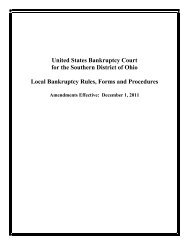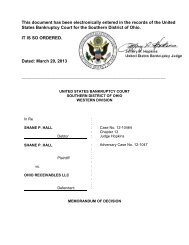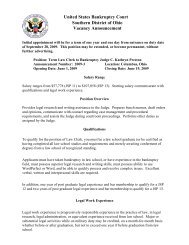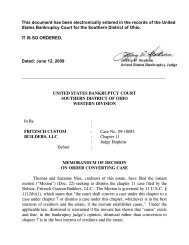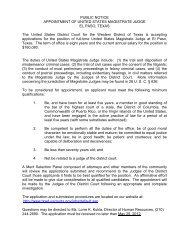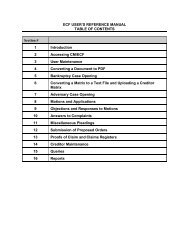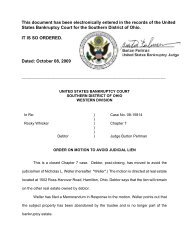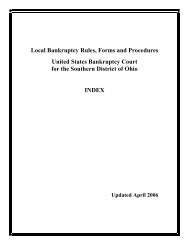This document has been electronically entered in the records of the ...
This document has been electronically entered in the records of the ...
This document has been electronically entered in the records of the ...
You also want an ePaper? Increase the reach of your titles
YUMPU automatically turns print PDFs into web optimized ePapers that Google loves.
Case 3:05-bk-38518 Doc 91 Filed 06/25/10 Entered 06/25/10 11:57:42 Desc Ma<strong>in</strong><br />
Document Page 14 <strong>of</strong> 20<br />
F<strong>in</strong>. Enters, Inc. (In re Nat'l Century F<strong>in</strong>ancial Enters., Inc.), 423 F.3d 567, 574 (6th Cir. 2005).<br />
Core proceed<strong>in</strong>gs raise ord<strong>in</strong>ary bankruptcy issues, such as those perta<strong>in</strong><strong>in</strong>g to property <strong>of</strong><br />
<strong>the</strong> bankruptcy estate, preference and fraudulent conveyance claims <strong>of</strong> bankruptcy<br />
trustees, and violations <strong>of</strong> <strong>the</strong> bankruptcy stay or discharge <strong>in</strong>junctions. The Sixth Circuit <strong>has</strong><br />
def<strong>in</strong>ed a core proceed<strong>in</strong>g “as matters created by, or determ<strong>in</strong>ed by, a statutory provision <strong>of</strong><br />
<strong>the</strong> Bankruptcy Code.” Dayton Title Agency, Inc. v. Philadelphia Indemnity Ins. Co. (In re Dayton<br />
Title Agency, Inc.), 264 B.R. 880, 884 (Bankr. S.D. Ohio 2000), cit<strong>in</strong>g Michigan Employment<br />
Security Comm’n v. Wolver<strong>in</strong>e Radio Co., Inc. (In re Wolver<strong>in</strong>e Radio Co.), 930 F.2d 1132, 1144<br />
(6th Cir. 1991). Non‐core proceed<strong>in</strong>gs “do not <strong>in</strong>voke a substantive right created by federal<br />
bankruptcy law and could exist outside <strong>of</strong> bankruptcy law.” Id. See also Bliss Techs., Inc. v.<br />
HMI Indus., Inc. (In re Bliss Techs., Inc.), 307 B.R. 598, 602‐03 (Bankr. E.D. Mich. 2004). 9<br />
Moser’s perfunctory request under <strong>the</strong> Ohio vexatious litigator statute is not a “core<br />
proceed<strong>in</strong>g” as it does “not <strong>in</strong>voke a substantive right created by federal bankruptcy law<br />
and is one that could exist outside <strong>of</strong> <strong>the</strong> bankruptcy.”<br />
Thus, this claim is not a core<br />
proceed<strong>in</strong>g or claim.<br />
However, as a result <strong>of</strong> General Order No. 05‐02, <strong>the</strong> general order <strong>of</strong> reference <strong>in</strong><br />
this district, this court also <strong>has</strong> orig<strong>in</strong>al, but not exclusive, jurisdiction over “all civil<br />
9 The dist<strong>in</strong>ction between core and non‐core proceed<strong>in</strong>gs was a response to <strong>the</strong> Supreme Court’s decision <strong>in</strong><br />
Nor<strong>the</strong>rn Pipel<strong>in</strong>e Constr. Co. v. Marathon Pipe L<strong>in</strong>e Co., 458 U.S. 50 (1982) that “held that <strong>the</strong> Congressional<br />
grant <strong>of</strong> jurisdiction to bankruptcy courts to decide ‘private rights’ matters, such as state breach <strong>of</strong> contract<br />
claims, was unconstitutional.” Dayton Title Agency, Inc. v. Philadelphia Indemnity Ins. Co. (In re Dayton Title<br />
Agency, Inc.), 264 B.R. 880, 882‐83 (Bankr. S.D. Ohio 2000), cit<strong>in</strong>g Marathon, 458 U.S. at 87. Under <strong>the</strong> post‐<br />
Marathon jurisdictional scheme, core proceed<strong>in</strong>gs under 28 U.S.C. § 157(b)(2) are subject to f<strong>in</strong>al<br />
determ<strong>in</strong>ations by <strong>the</strong> bankruptcy courts. However, <strong>in</strong> non‐core proceed<strong>in</strong>gs, that are o<strong>the</strong>rwise “related to”<br />
Title 11, bankruptcy courts “shall submit proposed f<strong>in</strong>d<strong>in</strong>gs <strong>of</strong> fact and conclusions <strong>of</strong> law to <strong>the</strong> district court<br />
and any f<strong>in</strong>al order or judgment shall be <strong>entered</strong> by <strong>the</strong> district judge after consider<strong>in</strong>g <strong>the</strong> bankruptcy judge’s<br />
proposed f<strong>in</strong>d<strong>in</strong>gs and conclusions and review<strong>in</strong>g de novo those matters to which any party <strong>has</strong> timely and<br />
specifically objected.” 28 U.S.C. § 157(c)(1); Orion Pictures Corp. v. Showtime Networks, Inc. (In re Orion Pictures<br />
Corp.), 4 F.3d 1095, 1101 (2nd Cir. 1993).<br />
14






